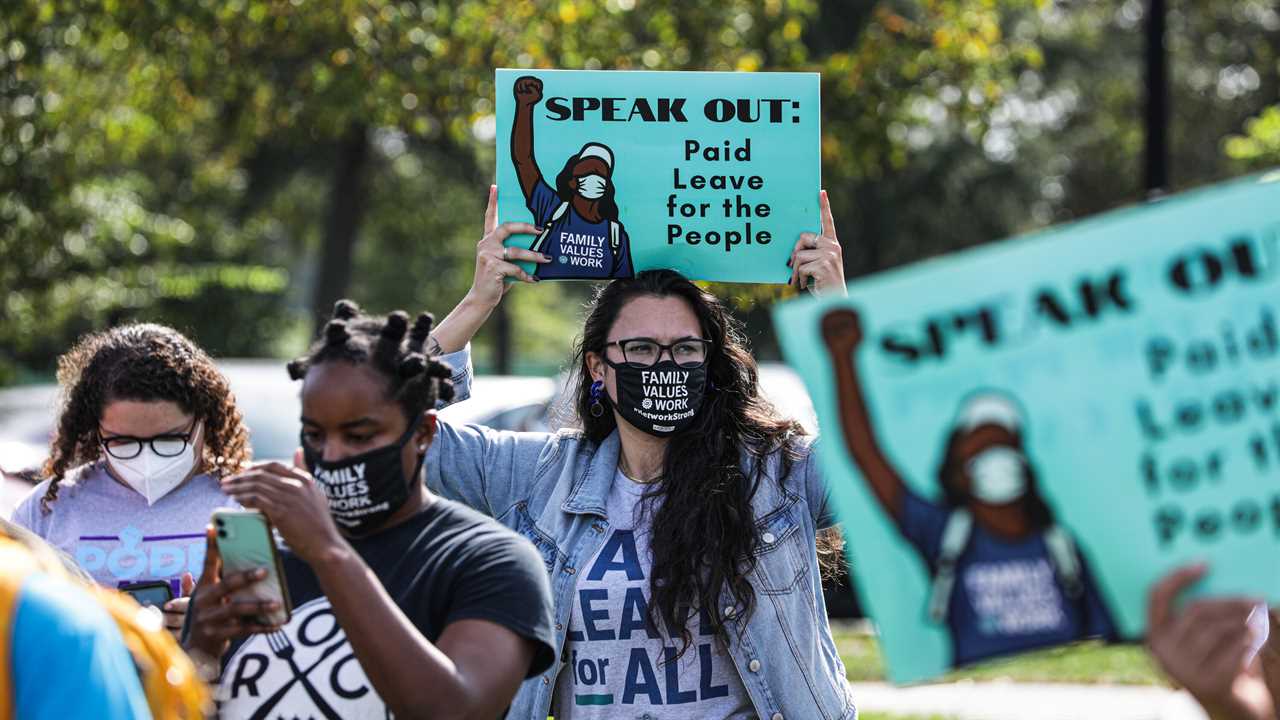
WASHINGTON — Christina Hayes, 34, stopped going to the doctor for treatment of her lupus when she was pregnant and working at a cable company in Michigan in 2013. She had used up her vacation days, and without paid sick leave, she worried about paying her rent and electricity bill if she took more time off.But after her blood pressure spiked, her doctors induced labor two months early, fearing that she might have a seizure. She and her baby ended up being fine, but Ms. Hayes, now an airline gate agent in Inkster, Mich., said that having paid leave would have allowed her to prioritize her health over her paycheck.“I would have been able to schedule doctor’s appointments better,” she said. “I might not have gone into premature labor.”Paid leave, a cornerstone of President Biden’s economic agenda, is one of the many proposals at risk of being scaled back or left out of an expansive social safety net bill that Democrats are trying to push through Congress. Mr. Biden’s initial $3.5 trillion plan called for providing up to 12 weeks of paid leave for new parents, caretakers for seriously ill family members and people suffering from a serious medical condition. Democrats proposed compensating workers for at least two-thirds of their earnings and funding the program with higher taxes on wealthy people and corporations.But as Democrats try to shave hundreds of billions off the overall policy package to appease moderate holdouts, paid leave could wind up shrinking to just a few weeks. That is alarming supporters of paid leave, who view this as the best chance to secure a crucial safety net for workers, particularly women.Researchers and economists say a federal paid leave program could provide a jolt to the labor market, lifting women’s participation in the labor force and increasing the likelihood that mothers return to work after having children. Research also has shown that paid leave policies would be particularly beneficial for people of color and low-wage workers, who are among those least likely to get such a benefit from their jobs.Only 23 percent of private-sector workers have paid family leave through their employers, and 42 percent have access to personal medical leave through an employer-provided short-term disability insurance policy, according to the Bureau of Labor Statistics.Under the Family and Medical Leave Act of 1993, workers at companies with at least 50 employees can take 12 weeks of unpaid leave. The United States is the only rich country without a federal paid leave mandate for new parents or for medical emergencies.Paid leave advocates say they have received assurances from the White House and congressional leadership that Democrats are continuing to push for the proposed program.“We’re a critical voting bloc,” said Molly Day, the executive director of Paid Leave for the United States. “Women are not going to forget the decisions that were made now when we go to the ballot box.”Negotiators have discussed ways to bring down the cost of the program, such as reducing the number of weeks offered or the maximum benefit an individual could receive each month, according to people familiar with the talks. Lawmakers have also discussed trimming the number of weeks initially offered, then phasing in a 12-week benefit over a decade.Many top Democrats say they remain committed to the original paid leave plan and have urged their colleagues in Congress and the Biden administration to keep the program intact.Representative Rosa DeLauro, a Democrat of Connecticut, said she was worried about how the program might be pared back, particularly if the benefit is phased in.“I am concerned at how long it will take us to get to that 12 weeks,” Ms. DeLauro said. “It shouldn’t take 10 years to do that.”Some Democrats say passing a federal paid leave program has become more crucial amid a global pandemic that has exposed the need for workers to have access to medical and sick leave without worrying about how they will pay their bills. The social policy legislation is being fast-tracked through the Senate using a process known as reconciliation.“If we really want to achieve paid leave in the next decade, now is the only moment, through reconciliation,” Senator Kirsten Gillibrand of New York said. “If you want to get everyone working who wants to be working, paid leave has to be part of the strategy.”Research on California, the first state to offer paid family leave, has mostly shown that paid leave has a positive effect on women’s wages and participation in the labor force. Nine states and the District of Columbia have passed paid leave programs.Christopher J. Ruhm, a professor of public policy and economics at the University of Virginia, found that under California’s paid leave law, new mothers who had workedBy: Madeleine Ngo
Title: Biden’s Paid Leave Plan at Risk as Lawmakers Look to Shrink Package
Sourced From: www.nytimes.com/2021/10/18/us/politics/biden-paid-leave.html
Published Date: Mon, 18 Oct 2021 23:12:37 +0000
Read More
 UK PoliticsWorld PoliticsVideosPrivacy PolicyTerms And Conditions
UK PoliticsWorld PoliticsVideosPrivacy PolicyTerms And Conditions
